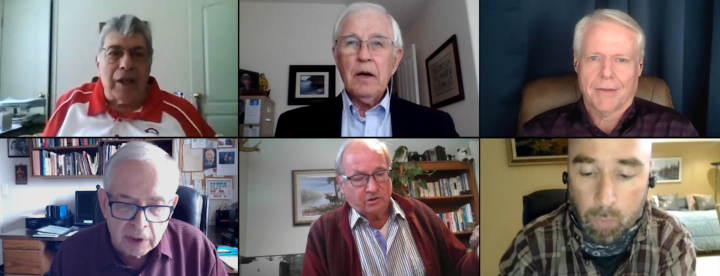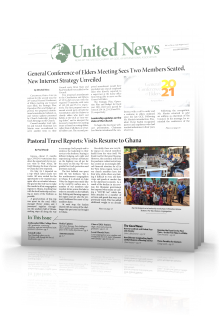2021 Canadian Ministerial Conference Held Virtually

This year because of COVID-19 restrictions, the conference was held via Zoom on Sunday, June 6 from noon till about 6 p.m. EDT. We had 31 connections. The technology worked flawlessly, thanks to Paul Wasilkoff and Warren Poffenroth, who took care of the technical details.
Anthony Wasilkoff, the Director of Operations, asked Robert Berendt to start the meeting with prayer. After that, we were shown a PowerPoint presentation with photos from past conferences and photos of deceased elders and wives.
Robert Dick gave an insightful presentation titled, “The History of United’s Founding.” He traced events from 1992 up to the General Conference of Elders meeting in December 1995. This topic had been assigned to him for presentation at the U.S. General Conference of Elders meetings in May 2020, but the pandemic hit and it was never presented. It is wonderful to have this material archived for future generations.
Gary Antion gave a two- part presentation on “Facets of the Ministry” covering Pastor, Preacher, Counselor, Visitor, Personal Life and Family Life. He read a poem, “Requirements for Being a Shepherd,” written by late elder Gary Lucas, and covered a handout with scriptures from 1 Timothy 3:1-7, Titus 1:6-9 and 1 Peter 5:1-3. He also covered some scriptures from another handout, “How to Look on the Congregation.” Elders need to serve their congregations with respect, love and care.
John Elliott, connecting online from Tulsa, Oklahoma, presented on “Mentoring in Action,” along with an extensive handout, “Pastor’s Mentoring Program for Elders.” Afterwards, he left time for some heartfelt discussion about priorities and usage of our time. A part of the presentation synopsis said: “Mentoring is not a program, nor a duty. It’s an action that one engages in to alleviate himself from limiting responsibilities that others would benefit from taking on. A mentor leaves a wake of responsibilities being managed by a growing number of people. From mentoring infant children to budding church leaders, your legacy can be one of actively transferring responsibilities to others in order to pursue more important things at hand.”
After a short break, Rainer Salomaa gave a presentation on “Becoming Whole Again.” He had taken part in a two-day virtual conference sponsored by the Canadian Mental Health Association, which had been designed to help employers create and maintain mentally healthy workplaces despite the obstacles of 2020. He shared material from one presentation by Dr. Susan Biali Hass, MD, on Becoming Whole Again—foundations of mental health, healing and resilience. The focus was on burnout—what it is and how to protect yourself from it—and building resiliency.
Next, Sheldon Sitter delivered a message on “The Conversion of Our Congregations,” in which he discussed some of the challenges during the COVID-19 pandemic where we have seen our congregations and church services convert from in-person gatherings to online meetings. In his synopsis, he wrote, “If government restrictions on gatherings are lifted, will our members return to assembling and fellowshipping in person; or will they be more comfortable and apt to stay home and participate in an online service? If some of them opt for an online service, will that service be ours? As congregational leaders we must be prepared and ready to serve all of God’s people, whether in-person or remotely. How do we do that? What does this mean for each of us from a practical point of view? We could look at this congregational conversion as a threat to our current method of operation, but we could also choose to see it as an opportunity. So, what exactly is the opportunity, and how can we make the most of it as we do our best to serve God?” He left time for some good discussion.
We were honored to have UCGIA president Victor Kubik online during the entire meeting. He took about fifty minutes to discuss the future of the Church and what we should be doing now to prepare for the next phase. He spoke about how we are living in a momentous time of transition for mankind. It is also a time of transition in the churches and the ministry of the United Church of God. We are already preparing the way for new overseers and a new generation of leadership. He also spoke about steps that we are currently taking to facilitate this progression. He asked, “How are we reaching out to the world and how are we caring for the people whom God has called without altering God’s unchangeable doctrines and values? What we are doing in the proclamation of the gospel, training ministers, and caring for our brethren?” He also took time to respond to some questions before and after the presentation.
Robert Dick’s final presentation was titled, “Yardsticks to Measure Sermons and Speakers.” He shared his experience being part of a pilot project in a group of eight elders who listened to and evaluated each other’s sermons. Some entered the program with trepidation. Robert said “the big bonus so far has been getting to know fellow elders more through the shared experience.” In the presentation, he took time to share some thoughts on speaking.
Michael Erickson, the chairman of the Compliancy Task Force, reviewed two policies that are required to be presented to the National Conference every two years, our Anti-Spam Policy and Sexual Misconduct and Youth Protection Policy.
Before we were dismissed with a prayer given by David Palmer, there was time taken for questions to the presenters.
The day went quickly and we look forward to having a face-to-face ministerial conference in June 2023. For next year, the plans are to have two mini conferences over Zoom, one for the east and one for the west.


